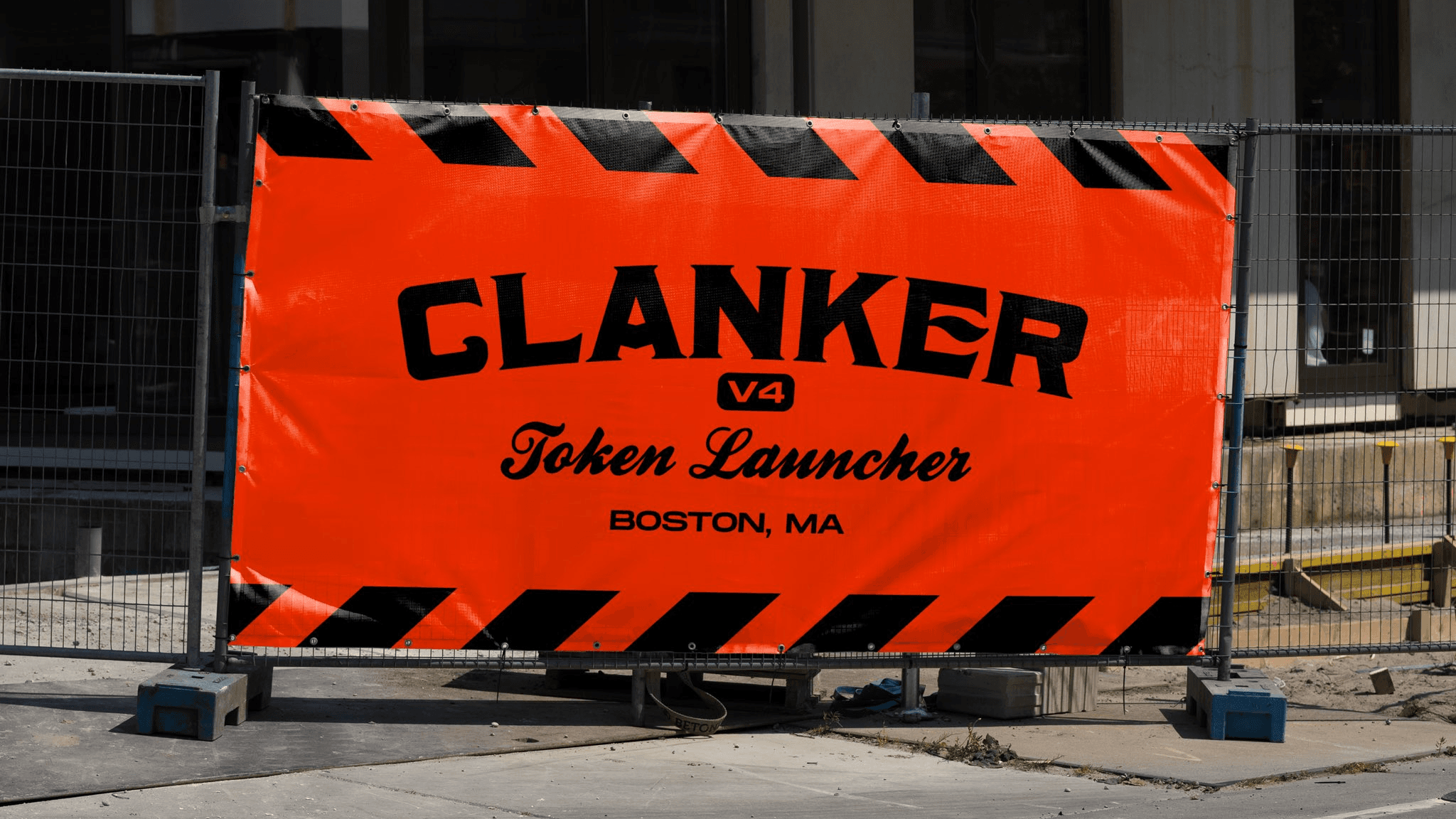Trust at scale: Clanker and capital formation




"Speculation turning into attention turning into users." That is the vision for project coins, neatly articulated by Jack Dishman, the head of token launchpad Clanker.
Naturally, Clanker is home to its fair share of ephemeral memecoins, but the platform is especially notable for facilitating the token launches of onchain startups. Bankr, Noice, Bracky, Native, $QR (recently profiled by Splits), and BETRMINT (likewise) are all frequent flyers on Clanker's leaderboard.
What attracts this caliber of project? Good tech is necessary, but not sufficient. Beyond existing, it needs to be accessible and trustworthy. Trust, however, is a social phenomenon: communal knowledge of what works and can be relied upon.
As adoption advances, great technology becomes trust infrastructure. The community can build securely on top of it, exploring the frontier and shipping new experiments that evolve in response to the market.
What's behind a ticker?
"I think of tokens as a blank canvas, and the creators are artists," Jack told Splits. "A token is just a medium to express whatever you want. Clanker's goal is to make these tokens as transparent as possible, where you can see the deployment context on the token pages, ideally giving traders that safety and assurance" about what they're buying.
Those traders keep showing up because builders also gravitate toward Clanker for peace of mind. "It really starts with trust," Jack said. "On launch, we lock the LP positions to prevent rugs. Our contracts are verified and audits are open-sourced."
For startups, using Clanker avoids the delay and anxiety of rolling a custom solution. "You could do it independently, but we save a lot of time and energy leading up to launch and actually get you to the meat of what you want to build with these tokens." Whereas "prior to Clanker, you'd have to pay a dev to develop contracts, maybe fork a contract, have it audited, deploy it, test it — all of that."
In a sense, "it's the same token with different configurations deployed every time," Jack explained. Clanker is battle-tested: you can be confident that the thing will work and behave as expected.
This technical foundation is essential, but not sufficient. Clanker is not an anonymous backend, rather an ecosystem with a distinct ethos. As always, social proof is priceless: "Developers see projects like Bankr, Bracky, or Noice and think, 'If they can do it through Clanker, I can too.'"
From bot to business
Homegrown on Farcaster, Clanker is the launchpad of choice for fellow builders debuting their ideas within that ecosystem. (All six of the examples listed above got their start on Farcaster.) The community there has seen Clanker grow from a scrappy upstart to a humming institution, with the team openly working through challenges as they arise.
Before becoming a full-fledged platform, Clanker started as a simple bot that operated directly within the social feed. You tagged @clanker with the name, ticker, and image you wanted, and it would deploy a memecoin for you and set up a liquidity pool that split trading fees between the token creator and the Clanker protocol.
When the bot first launched, Jack had no idea it was about to take over his life. Clanker was processing millions in volume in the first few months, and today they offer their own interface for customizing various token parameters, from LP settings to a vaulted reserve and more.
Clanker v0 "wasn't even ready when we launched," Jack recalled. "I wasn't thinking that this would be a full company." The team proceeded fairly casually until being bowled over by the market response.
"As soon as it started, we were like, 'Alright, we got to rebuild these contracts.'" The whole service had to be rearchitected: "A lot of [Clanker] was custodial through our deployer, so we had to run a massive migration to transfer ownership to the right creators. That was one of the most stressful things I've ever had to go through in my life."
"I had to step up," Jack said. "I had to learn everything on the fly, outside of the dev stuff." And the dev stuff, while more familiar, was no joke either: Jack went from tinkering with portfolio projects, as a dev on sabbatical, to overseeing the systems of a business with millions in revenue.
It was a trial by fire. Now, 11 months into the existence of Clanker, Jack has proved his willingness to make hard decisions under pressure.
Doing that in public, under constant scrutiny, is the hardest part of his job.
Filtering signal from noise
Dealing with public criticism has been the steepest learning curve. "You can't say some things that you want to say, that your emotions want you to say. You have to turn the other cheek." Jack is constantly bombarded with suggestions and demands, delivered with varying levels of courtesy. He's had to grow a thicker skin.
"I get a bunch of people telling me what I should do, and I'm not used to being the person that calls the shots." Now that he is that person, the challenge is "filtering out a lot of these opinions and just continuing to focus on what you need to get done."
Jack has learned that proactive transparency is key (similar to Jake of $QR). "What I tell people is: under-promise and over-deliver. Not living up to expectations is the hardest pitfall."
Communicating publicly with token holders is only half the equation. Jack spends substantial time talking to token creators, often "helping [them] configure their deployment — whether they're vaulting some, they want to do an airdrop, a dev buy, the fee percentages," etc.
By having these conversations, Jack is doing things that don't scale. There is no substitute for spending the time nurturing relationships because you truly care.
Fortunately, Jack enjoys it: "Learning what they're building, their past, and how Clanker has enabled them to have funding to build out their dreams. To me that's the most rewarding part."
Smart contracts, social contracts
Trust goes beyond the chain. One of Jack's takeaways from talking to builders: as community norms continue to coalesce, more guidance will be useful. "There's a fine line of etiquette around deploying a token. I've been trying to formulate 'Clank Commandments,' the dos and don'ts of launching a token." It's a work in progress.
"Tokens are a double-edged sword, right?" Jack reflected. "The second you launch a token, you're on the hook whether you like it or not."
Even when you welcome accountability, the dilemma is, accountability to whom? Different participants have different expectations — and everything happens in public. In the absence of clear narratives, people make up stories about what they're buying, then get upset when reality doesn't match.
"Right now, crypto's product-market fit is gambling," Jack said. "I don't think that's the end goal, but that's where we are." Outside of the industry, "People associate crypto with scamming. The connotation has to change for the masses to accept and trust it. You need to be able to trust these tokens."
Clanker is in the intriguing, tricky position of having one foot in the casino side of crypto, one foot in cutting-edge capital formation for onchain startups. Ideally, the company acts as a trust broker, channeling speculative energy into productive businesses.
The community decides
Clanker's mission is pretty straightforward. "We want to build the best token deployment experience," Jack said. "You have an idea, you need funding, you want to build something. Let us help you get there."
To make this happen, Jack and his team are dedicated to helping other teams interface with the sprawling, chaotic, cantankerous, yet ultimately optimistic and vigorous scene surrounding Clanker, Base, and crypto tokens writ large.
Internet capital markets are well underway. "It's up to the communities to decide, or the traders to decide, if this is valuable," Jack said. Clanker, along with every project that uses Clanker to get rolling, will live or die by the wisdom of the crowd.
At Splits we're building institutional-grade banking that's instantly available to everyone in the world. Built on Ethereum. No account minimums, paperwork, or legal entity needed. Sign up today.